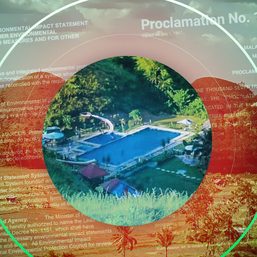SUMMARY
This is AI generated summarization, which may have errors. For context, always refer to the full article.

The Bohol provincial government turned over its probe into the Repa investment scam that defrauded more than a thousand people there to the Philippine National Police’s Criminal Investigation and Detection Group (CIDG) for the arrest of perpetrators and recovery of P700 million in losses.
Bohol Provincial Legal Officer Gregory Delgado confirmed to Rappler on Tuesday, November 23, that his office has concluded the case buildup and endorsed victims’ affidavits to the CIDG.
In online exchanges with Rappler, Delgado said more than 1,000 victims sought assistance and “around 500 affidavits were gathered” on orders of Bohol Governor Arthur Yap.
Yap issued Executive Order No. 49, creating a special task force called Heart of Justice to ensure a swift investigation and the filing of charges against the perpetrators.
“Based on the affidavits gathered, the losses summed up to P700 million. The resellers, millennials, [and] buyers mostly have [local] occupations or families [working] abroad. Individually, they have lost P10,000 to as [much] as P1 million,” Delgado said.
Probers have already identified the top management behind the investment scam.
“Some of them [are] from Mindanao [while] majority [are] from here in Bohol,” the provincial legal officer said.
“The ones who suffered big impact [like] emotional stress were the resellers, since aside from losing money, they are being hunted and persecuted by their buyers even if they explained they remitted the proceeds to the administrators.”
Repa as a Ponzi scheme
In October, the Securities and Exchange Commission (SEC) had issued an advisory to warn the public that Repa was a Ponzi scheme.
“Repa or Repa Paluwagan’s lack of juridical personality and registration pertaining to its securities with the commission make its activities illegal, fraudulent, and injurious to the investing public,” the SEC said.
“The operations of this entity is a Ponzi scheme which is defined as an investment fraud that involves the payment of purported returns to existing investors from funds contributed by the new investors.”
A Ponzi scheme eventually collapses when recruiting new investors becomes difficult or when many existing investors opt to cash out. When these happen, newer investors at the bottom of the pyramid would no longer receive their returns.
The SEC said the people behind Repa offered victims slots for investment packages “where one may invest P50,000, promising a return of P20,000 or an equivalent of 40% interest rate of return” in just two weeks.
Other investment packages included the following:
- P1,500 would turn into P2,500
- P2,500 would turn into P4,000
- P5,500 would turn into P7,000
- P9,000 would turn into P13,000
- P14,000 would turn into P25,000
- P25,000 would turn into P40,000
- P28,000 would turn into P50,000
The scammers used social media platforms like Facebook and personal transactions.
“Probably, the culprits designed this for them not to have…[a] connection or paper trail with the buyers. So the resellers who remitted the money to the administrators and/or masterminds earned the ire…of buyers,” Delgado said.
Delgado told Rappler that the masterminds even directed resellers to provide promissory notes that buyers can sign if they lack immediate funds for investments. These notes “enticed them to [part with] their hard-earned money.”
“If it is too good to be true, they should suspect the same,” added Delgado.
If found guilty, investment scammers could face a maximum fine of P5 million or up to 21 years in prison. – Rappler.com
Art Lubiano is a Visayas-based journalist and an awardee of the Aries Rufo Journalism Fellowship.
Add a comment
How does this make you feel?






There are no comments yet. Add your comment to start the conversation.